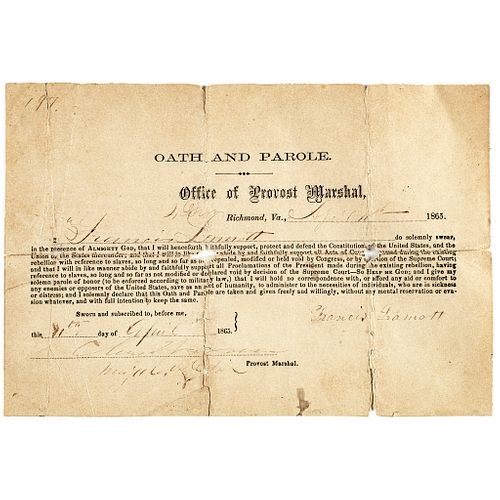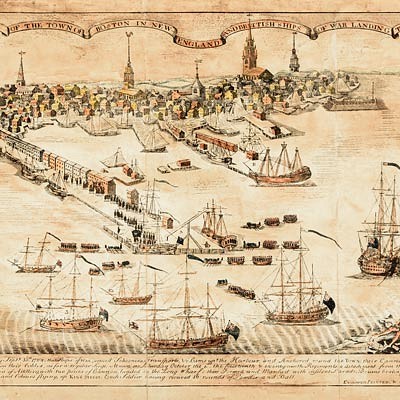April 11, 1865 Confederates Civil War OATH + PAROLE Certificate Richmond, VA.
Lot 232
Categories
Estimate:
$800 - $1,000
Absentee vs Live bid
Two ways to bid:
- Leave a max absentee bid and the platform will bid on your behalf up to your maximum bid during the live auction.
- Bid live during the auction and your bids will be submitted real-time to the auctioneer.
Bid Increments
| Price | Bid Increment |
|---|---|
| $0 | $10 |
| $200 | $20 |
| $300 | $25 |
| $500 | $50 |
| $1,000 | $100 |
| $2,000 | $200 |
| $3,000 | $250 |
| $5,000 | $500 |
| $10,000 | $1,000 |
| $20,000 | $2,000 |
| $30,000 | $2,500 |
| $50,000 | $5,000 |
| $100,000 | $10,000 |
| $200,000 | $20,000 |
| $300,000 | $25,000 |
| $500,000 | $50,000 |
About Auction
By Early American History Auctions
Mar 20, 2021
Set Reminder
2021-03-20 12:00:00
2021-03-20 12:00:00
America/New_York
Bidsquare
Bidsquare : Autographs-Colonial-Political-Americana
https://www.bidsquare.com/auctions/early-american-history-auctions/autographs-colonial-political-americana-6509
330 Lots of Rare, Historic Autographs, Americana, Civil War Era, George Washington, Abraham Lincoln, Slavery & Black History, Revolutionary War Era, Colonial America, Federal Period, War of 1812, Colonial Currency, Indian Peace Medals & more... Early American History Auctions auctions@earlyamerican.com
330 Lots of Rare, Historic Autographs, Americana, Civil War Era, George Washington, Abraham Lincoln, Slavery & Black History, Revolutionary War Era, Colonial America, Federal Period, War of 1812, Colonial Currency, Indian Peace Medals & more... Early American History Auctions auctions@earlyamerican.com
- Lot Description
Civil War Confederate Documents
Rare April 11, 1865 Signed Confederate Civil War Printed "Oath & Parole" Certificate Executed at Richmond, Virginia
April 11, 1865-Dated Civil War Appomatox Courthouse Surrender (April 9, 1865) Period, Partially-Printed Fully Signed and Executed, "Oath & Parole" Certificate for Confederate Richmond, Virginia, Fine.
This rare Appomattox Courthouse Surrender Period Document measures 5.25" x 7.75" printed in black text on light tan wove period paper. It is fully signed and executed on April 11, 1865 by the Office of the Provost Marshall, at Ricmond, Virginia as printed on this form, which is only a short distance in miles from the Appomattox Courthouse Surrender where, two days prior, on April 9, 1865 General Robert E. Lee had just surrendered his Confererate Army to General Ulysses S. Grant. This historic Document has expected wear from folding resulting in a couple of pencil erraser sized holes at the folds from wear and various edge splits that have been repaired and paper reinforced with older archival fiber tape on the blank reverse. This "Oath & Parole" form is issued and Signed by a "Francis Lamott". The Provost Marshal appears to be Frederic L. Manning (On 11/3/1862 Manning was commissioned into the Union Army, "H" Co. NY 148th Infantry and was Mustered Out on June 22, 1865 at Richmond, Virginia just slightly over two months after this very "Oath" was taken as the Civil War had officially concluded. It would therefore include the requirement in taking this "Oath" to agree to the tentative Thirteenth Amendment (Amendment XIII) to the United States Constitution which abolished Slavery and Involuntary Servitude, except as punishment for a crime. The 13th Amendment was passed by Congress on January 31, 1865, and ratified by the required 27 of the then 36 states on December 6, 1865 and proclaimed on December 18th. It was the first of the three Southern "Reconstruction" oriented Amendments adopted following the American Civil War.
So, now that I have an opportunity to review the Richmond Oath / Parole, a few things become apparent.
This parole was for a Richmond Civilian. How do I know?
A. There is no Military company noted.
B. The only Francis Lamott list in the Data Base is a private from New York. He would not be required to take the oath.
C. The only Confederate Francis Lamotte (spelled with an "e") was in the 2nd Texas throughout the war.
2.
Not much excitement there.
Based on it NOT paroling a Confederate soldier we have lost all the fun and value of; a. why was he in Richmond 10 days after the fall; b. did he walk off Appomattox ...
So, it is still a neat item albeit not the $1000 range. I'd play up the SLAVE references to the 13th amendment. Value in my mind my friend, +/-$300.
The Thirteenth Amendment (Amendment XIII) to the United States Constitution abolished slavery and involuntary servitude, except as punishment for a crime. The amendment was passed by Congress on January 31, 1865, and ratified by the required 27 of the then 36 states on December 6, 1865 and proclaimed on December 18. It was the first of the three Reconstruction Amendments adopted following the American Civil War.
President Abraham Lincoln's Emancipation Proclamation, issued on January 1, 1863 declared that the enslaved in Confederate-controlled areas were free. When they escaped to Union lines or federal forces-including now-former slaves-advanced south, emancipation occurred without any compensation to the former owners. Texas was the last Confederate territory reached by the Union army. On June 19, 1865-Juneteenth-U.S. Army general Gordon Granger arrived in Galveston, Texas, to proclaim the war had ended and so had slavery. In the slave-owning areas controlled by Union forces on January 1, 1863 state action was used to abolish slavery. The exceptions were Kentucky and Delaware where slavery was finally ended by the Thirteenth Amendment in December 1865.
In contrast to the other Reconstruction Amendments, the Thirteenth Amendment has rarely been cited in case law, but has been used to strike down peonage and some race-based discrimination as "badges and incidents of slavery". The Thirteenth Amendment has also been invoked to empower Congress to make laws against modern forms of slavery, such as sex trafficking.
Since 1804, states had divided into states that allowed or states that prohibited slavery. Slavery was implicitly recognized in the original Constitution in provisions such as Article I, Section 2, Clause 3, commonly known as the Three-Fifths Compromise, which provided that three-fifths of each state's enslaved population ("other persons") was to be added to its free population for the purposes of apportioning seats in the United States House of Representatives and direct taxes among the states.
Though three million Confederate slaves were in fact freed by Lincoln's Emancipation Proclamation, their post-war status was uncertain. To ensure the abolition was beyond legal challenge, an amendment to the Constitution to that effect was initiated. On April 8, 1864, the Senate passed an amendment to abolish slavery. After one unsuccessful vote and extensive legislative maneuvering by the Lincoln administration, the House followed suit on January 31, 1865. The measure was swiftly ratified by nearly all Northern states, along with a sufficient number of border states (slave states not part of the Confederacy) up to the assassination of President Lincoln. However, the approval came via his successor, President Andrew Johnson, who encouraged the "reconstructed" Southern states of Alabama, North Carolina, and Georgia to agree, which brought the count to 27 states, leading to its adoption before the end of 1865.
Though the Amendment abolished slavery throughout the United States, some Black Americans, particularly in the South, were subjected to other forms of involuntary labor, such as under the Black Codes, as well as subjected to white supremacist violence, and selective enforcement of statutes, besides other disabilities.
Our Auction Contents:
Black History & Slavery: (Lots 1 - 63)
Abraham Lincoln Related: (Lots 64 - 74)
Historic Autographs: (Lots 75 - 235)
Colonial America: (Lots 236 - 261)
Revolutionary War: (Lots 262 - 304)
George Washington Related: (Lots 305 - 306)
Early American Guns & Weapons: (Lots 307 - 318) - Shipping Info
-
Early American provides in-house worldwide shipping. Please contact us directly if you have questions about your specific shipping requirements.
-
- Buyer's Premium



 EUR
EUR CAD
CAD AUD
AUD GBP
GBP MXN
MXN HKD
HKD CNY
CNY MYR
MYR SEK
SEK SGD
SGD CHF
CHF THB
THB












